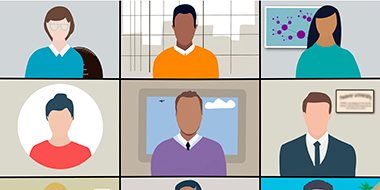About cookies on this site Our websites require some cookies to function properly (required). In addition, other cookies may be used with your consent to analyze site usage, improve the user experience and for advertising. For more information, please review your options. By visiting our website, you agree to our processing of information as described in IBM’sprivacy statement. To provide a smooth navigation, your cookie preferences will be shared across the IBM web domains listed here.
Perspectives
Building a “future of work” that works
24 June, 2021 | Written by: Ian Lithgow
Categorized: Human Resources | Industries | Perspectives
Share this post:
Building a “future of work” that works
“In these unprecedented times”: the words as familiar as the pandemic by now, thanks to the radical and accelerated pace of change we’re living through.
Work is changing. Technology is changing. And so are we.
While Covid 19 has undoubtedly served as an accelerant, businesses have grappled with uncertainty for a long time: from the evolving role of tech and digital labour, to shifting expectations of the workplace and the fact we’re all living and working longer.
But while the current climate is volatile, complex and ambiguous, it’s also a huge source of competitive advantage for those that can make the most of it. By learning to embrace the opportunities, we can design more diverse, inclusive and productive businesses with new and better ways of working.
Imagine if location was no longer relevant. Organisations would have access to an unlimited and diverse global talent pool with the skills and capabilities they need to drive better outcomes. And if they proactively harnessed emerging technologies they’d benefit from even greater efficiencies, reducing costs while boosting the effectiveness of their teams.
A forward-thinking approach benefits employees too, reducing – in some cases removing –traditional barriers to entry in support of more diverse, flexible and rewarding ways of working.
So as we start planning for the post pandemic “return to work”, how do we ensure we’re looking beyond immediate next steps to design a future of work that really works?
At IBM, we believe this moment is not about iterating; it’s about innovating. So many barriers have already been removed by the pandemic. Now is the time for organisations to lean into change.
This requires a delicate balancing act between humans and technology. While it may be tempting to lead with tech, the key to success lies firmly in putting an even greater emphasis on people.
Striking the right balance
The fact remains: if you stay focused on the wants and needs of your end-users, the rest will follow.
Start with customers and employees and design backwards, thinking about how and where to implement technology in a way that augments their performance to support delivery and add value.
Then, adopt a deliberate and structured approach to embedding these changes. Invest in change management, comms and engagement, leadership, performance management and training to support the future you want to create.
We recently worked with Orange France to develop a comprehensive Orange Campus programme, clearly mapping out how talent and tech can work together to upskill employees and deliver new digital offerings to customers. The initiative saw a 150% increase in customer sales on digital channels, with 50% of employees achieving new digital skills. This reflects our own approach within IBM, where we work hard to ensure the continued learning and re-skilling of our employees.
As technology becomes increasingly pervasive in our working lives, businesses must also find ways to safeguard employees and set clear boundaries around new rules of engagement. Throughout the pandemic, IBM’s “work from home” pledge has served to guide, reassure and remind our teams of the importance of flexibility, adaptability and compassion when working remotely.
Why trust is a must
Change is daunting and people naturally have concerns in the face of uncertainty. To help them embrace the opportunities, organisations must do everything they can to take away the fear.
This starts with building trust and transparency. People are less sensitive to change when they’re actively engaged in it. Listen to your teams, be transparent and get them involved in designing their future. It’s no longer about breaking down barriers – it’s about not having them in the first place.
Finally, make guarantees. Help your teams understand that this is not about reducing headcount or costs; it’s about creating more opportunities for them to add value, re-skill and focus on what they do best.
Measurement matters
For long term, sustainable change, organisations must ensure the measurement and rewards structures they have in place support the behaviours and ways of working they want to promote. Start by shifting from measuring outputs to measuring outcomes, and rewarding employees accordingly.
With the world around us changing so quickly, it’s imperative for businesses to keep looking ahead, learning and partnering with the right organisations to help them navigate the future.
We should know.
We’re no strangers to wholesale transformation at IBM. In fact, we’re going through our seventh. At 110 years of age, we’ve seen a lot and we’re more excited than ever to help our partners usher in the future. Because if there’s one thing we can be sure of in these “unprecedented times”, it’s that change is here to stay.
Ian Lithgow is a Partner and leads IBM’s Talent and Transformation practice in the UK. He will be leading a facilitated workshop on the 14th July to explore the Future of Work with a group of his clients. To find out more, contact him – or read more on about IBM’s point of view around talent and transformation from the IBM Institute of Business Value:
Accelerating the journey to HR 3.0

Ian Lithgow
Partner in IBM Talent Transformation practice
More Perspectives stories
By Steve Freshwater and Skip Snyder on 24 January, 2022
Pandemic-driven changes bring Factory of the Future into the present
As we begin 2022, two years since the onset of COVID-19, it is clear that technologies like AI, IoT and hybrid cloud have been critical levers to help businesses achieve sustainability, resiliency, and agility in light of massive disruption. As social distancing kept workers at home, smart connectivity and the insights gathered can help scale […]
By Jeremy Bassinder on 15 January, 2021
How COVID-19 has accelerated digital transformation – and how to stay ahead in 2021
The disparity between digital haves and have-nots has never been greater, but it’s never too late to innovate. The mounting pressure for businesses to fast-track their digital transformation journeys was kicked into overdrive in 2020. While the bell has long been chiming for businesses to rapidly adapt, harness the power of data and streamline their […]
By Sharad Somanchi on 18 December, 2020
Let’s get personal: CX transformation to a segment of 1
There are broadly three intertwined factors that are driving transformation in customer experience in 2020. And, while wrestling with the complexity behind such change can be daunting, the upside for businesses who get it right can in itself be transformational. The first driver here is customers themselves. In a year that has accelerated online interaction […]





























